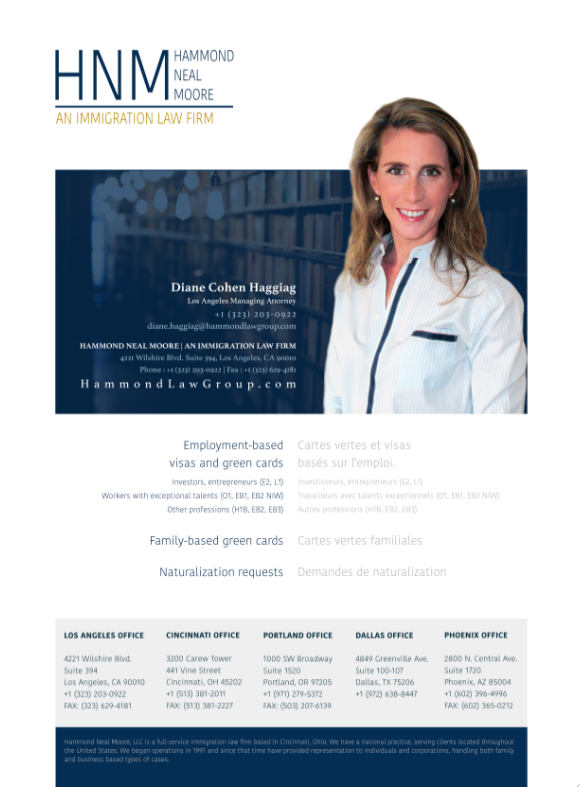Vous venez d’atterrir, vous êtes fraîchement débarqués de l’avion (enfin, aussi frais
que possible après 12 ou 16 heures de vol avec des gosses qui hurlent derrière…) et vous avez
hâte de franchir la dernière ligne droite (pas si droite finalement car les américains ADORENT
les files d’attente en serpentin). Une formalité ? Think again. You've just landed, you're fresh off the plane (well, as fresh as possible after 12 or 16 hours of
flying with screaming kids behind...) and you can't wait to cross the final stretch (not so straight
finally because Americans LOVE serpentine queues). A formality ? Think again.

Face aux autoritésVous vous apprêtez à vous tenir face au CBP officer*, dont l’uniforme n’est pas l? que pour vous impressionner, mais qui détient effectivement le pouvoir de vous laisser passer la frontière, ou pas. En matière d’immigration, il existe, en effet, trois autorités qui se partagent le pouvoir: le USCIS (United States Citizenship and Immigration Services), le CBP (Customs and Border Protection), et les consulats américains à l’étranger. Si l’obtention d’un visa auprès du consulat ou de l’USCIS est une belle étape de gagnée, cela ne garantit néanmoins pas que le CBP décide de s’y plier. Il peut, en effet, s’opposer à vous laisser entrer malgré un visa valable, s’il suspecte que vous avez menti pour l’obtenir ou que vous comptez enfreindre les termes du visa une fois sur le territoire. | Facing the authoritiesYou are about to stand in front of the CBP officer*, whose uniform is not there just to impress you, but who has the power to let you cross the border, or not. In matters of immigration, there are, in fact, three authorities that share power: the USCIS (the United States Citizenship and Immigration Services), the CBP (Customs and Border Protection), and the American consulates abroad. While obtaining a visa from the consulate or USCIS is a great step forward, this does not guarantee that CBP will decide to comply. He can oppose letting you enter despite a valid visa if he suspects that you lied to obtain it or that you intend to violate the terms of the visa once in the territory.What are your rights ?If you know that your situation is complicated, it is best to talk to an immigration lawyer BEFORE you leave, who will be able to advise you on the pitfalls to avoid and give you their contact details in the event of detention. |
Quels sont donc vos droits ?Si vous savez que votre situation est compliquée, le mieux est de vous entretenir avec un avocat d’immigration AVANT votre départ, qui saura vous conseiller sur les pièges à éviter et vous donnera ses coordonnées en cas de détention. Si vous êtes “invitéˮ à passer en « secondary inspection », le but est, pour le CBP officer, de vous questionner plus longuement. Le problème est que les voyageurs étrangers se trouvent alors dans une réelle position de faiblesse. Le questionnement après 15 heures de vol, et parfois 20 heures sans sommeil conduit à des incohérences qui peuvent enfoncer encore plus le voyageur dans des mensonges. Le voyageur n’a pas le droit de demander un avocat à ce stade, son passeport et son téléphone sont confisqués. L’officier a tout pouvoir pour fouiller ses affaires, accéder à son portable et son ordinateur et y lire tous les messages et emails, et il peut également accéder aux profils de réseaux sociaux. Inutile de préciser que ces agents trouvent souvent, à ce moment-l? , des éléments qui corroborent leurs doutes de départ, tels que : l’étudiant travaille illégalement ou la touriste vient pour se marier. | If you are "invitedˮ to go to "secondary inspection", the goal is for the CBP officer to question you further. The problem is that foreign travelers then find themselves in a really weak position. Questioning after 15 hours of flight, and sometimes 20 hours without sleep, leads to inconsistencies that can lead the traveler even further into lies. The traveler does not have the right to request a lawyer at this stage, his passport and his telephone are confiscated. The officer has full power to search his belongings, access his laptop and computer, and read all messages and emails, and he can also access social media profiles. Needless to say, these agents often find, at that moment, elements that corroborate their initial doubts, such as the student is working illegally or the tourist is coming to get married. |
| « Il existe des recours » | "There are remedies" |
| La fouille matérielle peut même s’accompagner d’une fouille corporelle approfondie, avec prélèvement d’ADN. Le questionnement et la fouille se concluent par un “sworn statement”, récapitulatif écrit sous serment, et dans les cas les plus graves, c’est le renvoi vers le pays d’origine avec interdiction d’entrée sur le territoire pendant 5 ans, voire à vie, pour les cas de fraude. Bon à savoir Si vous vous trouvez dans une telle situation, sachez que vous pouvez demander un remède magique : le “withdrawal of admission” - retrait d’admission. Cette technicité n’empêchera pas le retour en France mais évitera l’interdiction de séjour ultérieure. Il s’agit d’une faveur que le CBP officer peut octroyer mais il ne le propose généralement pas de luimême. Sachez donc que ce remède existe et qu’il faut le demander. Il s’agit essentiellement d’une formalité légale selon laquelle vous retirez votre demande d’entrée sur le territoire et, en somme, vous demandez à rentrer chez vous, comme si rien ne s’était passé. | The material search can even
be accompanied by an in-depth body search, with DNA sampling. The questioning and the
search ends with a "sworn statement", a summary written under oath, and in the most serious
cases, it is the return to the country of origin with a ban on entry to the territory for 5 years, even
for life, in cases of fraud.
Good to knowIf you find yourself in such a situation, know that you can ask for a magic remedy: the "withdrawal of admission". This technicality will not prevent the return to France but will avoid the subsequent ban on the residence. This is a favor that the CBP officer can grant but he generally does not offer it himself. |
| Si ce remède n’est pas octroyé, et que le ban de 5 ans, 10 ans ou à vie, est proclamé, sachez également qu’il existe des recours pour annuler une telle décision. Ces procédures sont néanmoins longues, complexes et très incertaines. Donc, évitez autant que possible le « secondary inspection » et ne prenez pas le passage de la frontière à la légère ! Diane Cohen Haggiag, Esq. Los Angeles Managing Attorney HAMMOND NEAL MOORE, LLC. * CBP Officer: Officers responsible for border security, including counter-terrorism, customs, immigration, trade protection, and agriculture.. | Know that this remedy exists and that you have to ask for it. It is essentially a legal formality whereby you withdraw your application to enter the territory and, in essence, ask to return home as if nothing had happened. If this remedy is not granted, and the ban of 5 years, 10 years, or life is proclaimed, also know that there are remedies to annul such a decision. However, these procedures are long, complex, and very uncertain. So avoid secondary inspection as much as possible and don't take the border crossing lightly. Diane Cohen Haggiag, Esq. Los Angeles Managing Attorney HAMMOND NEAL MOORE, LLC. * CBP Officer: Officers responsible for border security, including counter-terrorism, customs, immigration, trade protection, and agriculture.. |


















